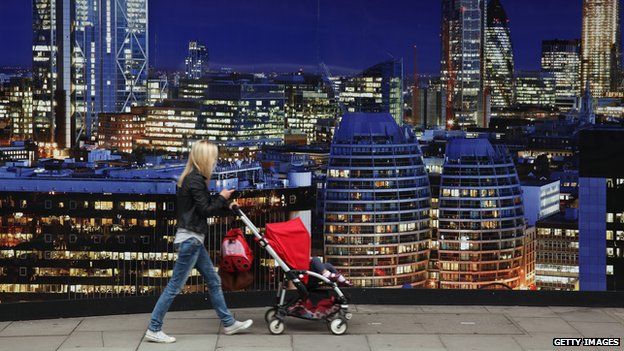Are we living in the Second Gilded Age?
- Published

Some of the statistics on income inequality that have propelled the issue up the global policy agenda are striking.
The share of income going to the top 1% has grown to the point the richest Americans now hold one-fifth of the country's overall income.
Adding another 9%, the top 10% richest Americans hold half of all of the income in one of the world's wealthiest countries.
According to the economist Thomas Piketty, it is slightly better in Europe, but the trend is similar.
In Britain, the top 10% hold over 40% of the country's income. In Germany and France, the top 10% hold over one-third of all income.
All of these shares have risen since the 1970s but not by so much as to rival the early 1900s.
For the US, it has risen by so much and is worse than during the roaring Twenties, a period of economic prosperity characterised by lavish displays of wealth.
It is no wonder this era has been dubbed the Second Gilded Age, the first having been during the late 19th to early 20th century and ended with the Great Depression of 1929.
But it is not just in the rich world. Although developing countries have seen poverty fall dramatically - one billion people have been lifted out of poverty since 1990 - income inequality has been unchanged since 1960, according to research by economists Amparo Castelló-Climent and Rafael Doménech.
Across countries, because of the relatively faster growth of emerging economies, inequality has dropped as the income gap has narrowed between developed and developing countries, according to the World Bank and economist Angus Deaton.
But within countries, inequality on average has risen or not improved significantly, not just in the West but also in countries like China.
Causes
One of the reasons is because, as countries industrialise and urbanise, they grow more quickly. Those who move into industry and cities earn more than those who don't. So, income inequality tends to rise with economic development.
However, countries can bring down income inequality through redistributive policies.
Without the social welfare system, inequality would be much higher in the UK and the rest of Europe. Not having such a system contributes to China's high levels of inequality.
For developed countries though, there is a lively debate over the causes of the increase in inequality over recent decades.
Mr Piketty believes that returns (r) to capital and their owners are greater than the growth rate (g) of an economy, so r > g is a reason why a rise in inequality is to be expected.
This has been a subject of contention as to whether the owners of capital such as property, companies and stocks will earn more than the growth in the average income of a country over time.
Inherited wealth is another explanation, though the evidence largely shows that earned income has been a more important driver. And as Paul Krugman points out, six of the 10 wealthiest Americans inherited their wealth so the trend isn't promising.
For France and Britain, the value of private capital as a share of income has skyrocketed to over 500% since the 1970s, while for the US that ratio has come down somewhat even though it is still a hefty 400%. As this wealth is passed along, the gap between the rich and the rest grows.
High levels of executive pay and a slew of other factors also play a part. For instance, the chief executive of a company listed on the S&P 500 earns an average of 204 times that of a worker in the same company, rising 20% just since 2009.
Solutions
Each of these causes suggests a different combination of policy solutions. For instance, progressive tax rates would help to address a wage gap.
The Organisation for Economic Co-operation and Development (OECD) Secretary-General Angel Gurria tells me that labour market and tax policies are needed to address this rise in inequality.
Mr Gurria says that there should be a cut in taxes to encourage employment, offset by a rise in certain taxes including green taxes, plus active labour market policies to cut employment costs.
He emphasises that a global wealth tax, such as that proposed by Mr Piketty, is too simple a solution.
For more on inequality, tune in for Talking Business with Linda Yueh: bbc.co.uk/talkingbusiness. Second Gilded Age?